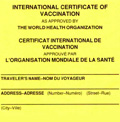 Officials in Brussels are looking at developing a standardised multi-lingual personal EU immunisation card in an effort to improve communication between vaccine service providers – such as doctors and public health nurses.
Officials in Brussels are looking at developing a standardised multi-lingual personal EU immunisation card in an effort to improve communication between vaccine service providers – such as doctors and public health nurses.
The ultimate goal of a vaccination passport would be to ensure that children who move between countries with different immunisation schedules do not miss out on crucial vaccinations. A similar scheme is already in place for pets and has helped boost vaccination rates, according to the European Commission.
The move would fit neatly with the theme of this year’s European Immunization Week (April 23-30): ‘shared solutions to common threats’.
Dr Antoon Gijsens, of the European Commission’s Directorate-General for Health & Consumers, told a conference on paediatric immunisation that a number of models already exist for keeping track of vaccination status (Click here to see his presentation).
The WHO has developed an International Certificate of Vaccination or Prophylaxis – known as the ‘yellow card’ – which provides authorities with details of which vaccines an individual has received. This is typically used by travellers visiting areas where specific vaccinations are required.
Patchwork of systems
A number of European countries and regions – including Luxembourg and Flanders in Belgium – have their own systems for monitoring immunisation, with a range of paper and electronic records in use.
However, language barriers and inconsistencies in the vaccine schedule from one region to the next mean such documents are not always useful when travelling.
Dr Gijsens said the European Commission had begun a comprehensive consultation process on childhood immunisation in 2009 which aimed to tackle this issue.
As part of a 44-question survey conducted as part of this exercise, stakeholders were asked whether an ‘EU immunisation passport’ – akin to the ‘pet passport’ already in operation – would be useful. More than 85% said such a system would prove helpful.
Cross-border collies
The pet passport was established in 2003 and applies to dogs, cats and ferrets. The system has greatly improved vaccination status and compliance with booster doses for pets, according to the European Commission.
Dr Gijsens said an immunisation passport for children could help improve vaccination rates and would complement – rather than replace – existing electronic immunisation registries operated by some public health authorites.
Around 100,000 children under the age of 14 migrate within the EU every year but vaccination schedules are different in each of the 27 member states.
For more on EU vaccination policy, click here
For more on the European pet passport, click here
For more on European Immunization Week, click here





Patricia McIntosh
June 7th, 2011
I find this rather a distressing concept and hope that it does not take away parents choice to abstain from immunisation programmes if they so choose for informed reasons.
Seston
June 8th, 2011
Thanks for shainrg. What a pleasure to read!
Janesa
June 22nd, 2011
This has made my day. I wish all pstongis were this good.
Takeo
June 22nd, 2011
Very true! Makes a change to see somneoe spell it out like that. 🙂
Pingback
October 23rd, 2019
[…] 2011, the European Commission floated concerns about minors who refused vaccines and suggested vaccination passports for children who traveling across the EU. Their focus moved to adults when the Healthy People 2020 […]
Pingback
December 4th, 2019
[…] Kommission Bedenken hinsichtlich Minderjähriger, die Impfungen verweigerten, und schlug Impfpässe für Kinder vor, die in der EU reisen. Ihr Fokus richtete sich […]
Pingback
April 26th, 2020
[…] of it aims at the production of digital biodata. That’s where, way beyond ‘vaccination passports’, the Bluetooth ‘virus tracking apps’ are […]